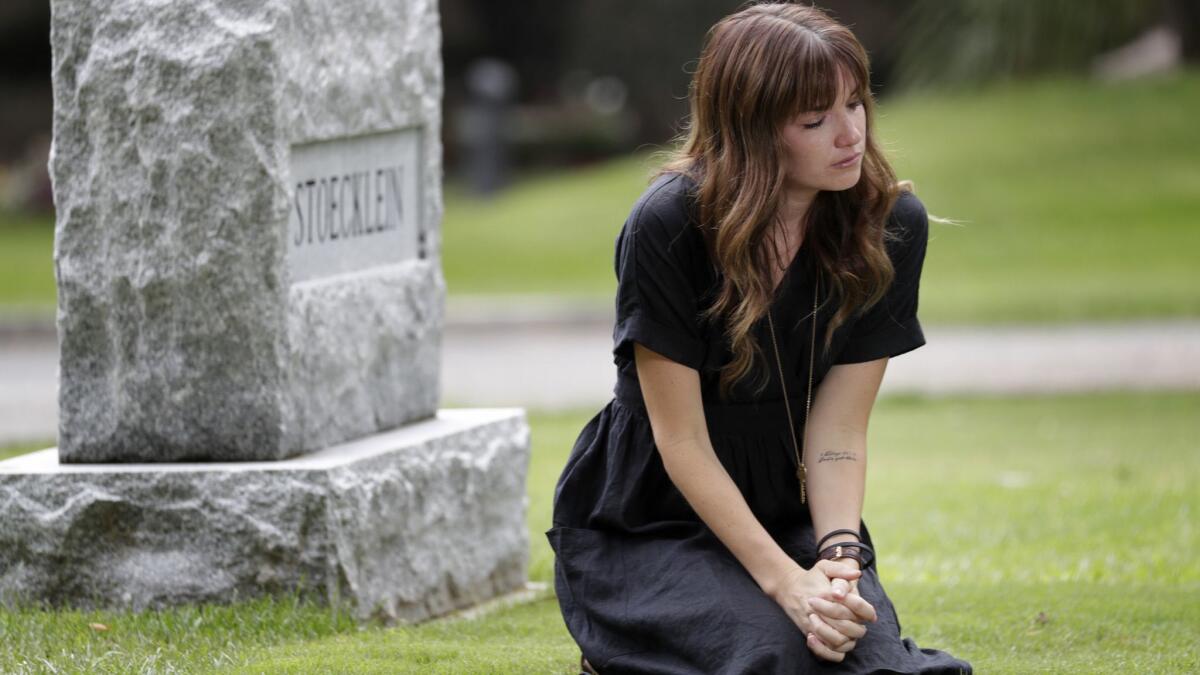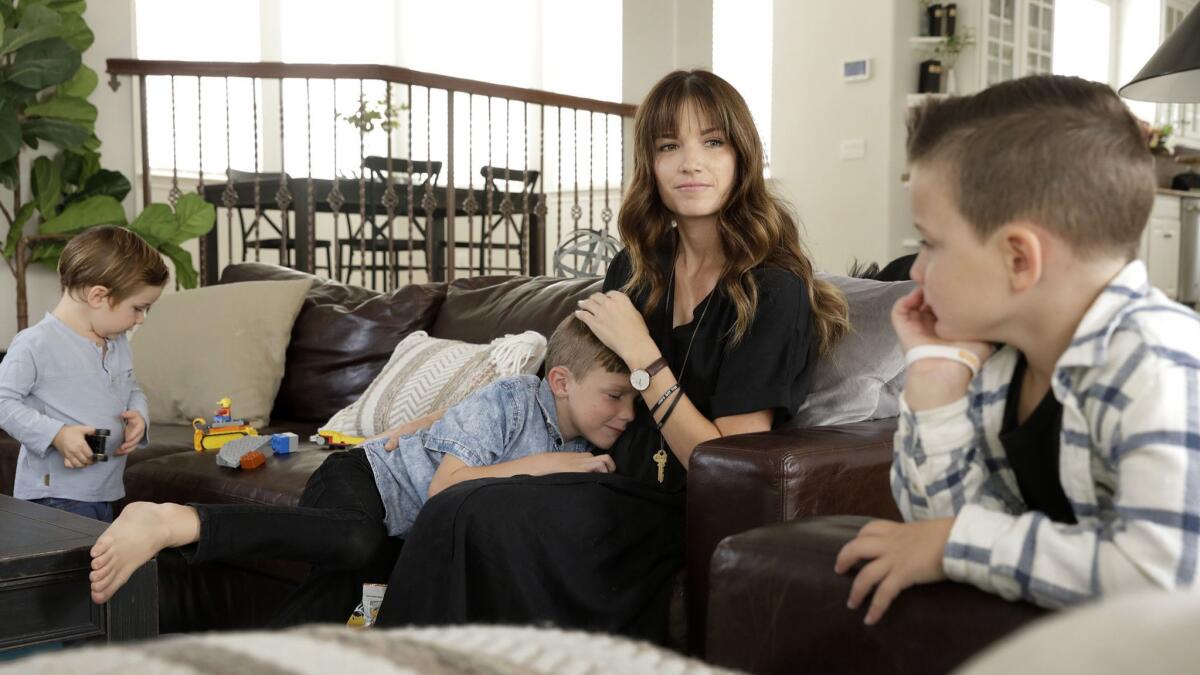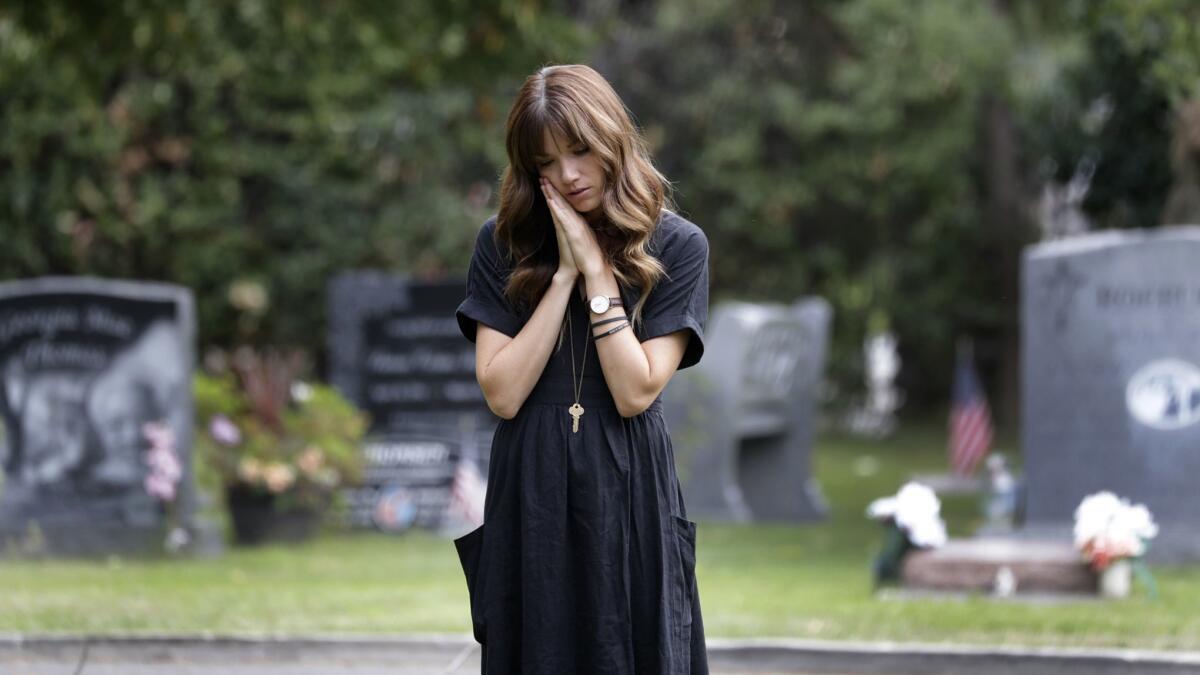A young pastor preached about depression, then killed himself. His widow wants to help others by talking about it

- Share via
The preacher wore black skinny jeans and a wireless microphone clipped to his ear. He looked like he was giving a TED Talk, gesticulating with his hands as he stood next to a large projector.
Pastor Andrew Stoecklein recounted the Old Testament story of the prophet Elijah, whose despair led him to pray for death. The prophet, Stoecklein told the large congregation at Inland Hills Church in Chino, Calif., was filled with anxiety, depression and suicidal thoughts.
“You see mental illness on display,” Stoecklein said. “Now that is something that we don’t like to talk about much, do we? Especially not in the church.”
A sinewy 30-year-old with a surfer dude accent and tattoos covering his right arm, Stoecklein had just returned to the pulpit from a four-month leave of absence in which he battled panic attacks and severe depression. This was the first in a series of sermons about mental illness he titled “Hot Mess.”
He clicked through suicide statistics on the screen. He listed resources. He implored his congregation to know that if they were fighting mental illness, they weren’t alone.
“There is hope, and there is help available,” the pastor said.
Twelve days later, he killed himself.
One of the top 10 causes of death in the United States, suicide saw its rate rise in 49 states from 1999 to 2016, according to the Centers for Disease Control and Prevention. In 2016 alone, nearly 45,000 people died by suicide.
But the topic often is avoided in the church, said Ed Stetzer, executive director of the Billy Graham Center at Wheaton College in Illinois. People often see anxiety and depression as problems fixable with prayer alone.
“We put mental illness in the category of spiritual struggles,” Stetzer said. “We wouldn’t have shame toward someone who broke their leg or had asthma or leukemia.”
Melinda Moore, co-chair of the National Action Alliance for Suicide Prevention’s Faith Communities Task Force, said there is a misconception that pastors are closer to God and don’t struggle with depression or suicidal thoughts. They “are expected to be everything to everyone at all times,” she said.
In 1996, Moore’s husband died by suicide. She was new to the Catholic faith, “but there was virtually no one in my church who wanted to talk to me about it,” she said.
When Stoecklein first met Kayla Saylors at Vanguard University in Costa Mesa, he was an outgoing surfer living in a beach house with his buddies. She was shy and loved his tattoos.
Their first date was at Alta Coffee in Newport Beach the night Barack Obama was elected president. They saw a Coldplay concert. Kissed in the rain. Dated a year. Were engaged a year. Then came three sons whose names Andrew chose: Smith. Jethro. Brave.
In 2015, Andrew’s father, David Stoecklein, who founded Inland Hills, a large evangelical church, died of leukemia. Andrew, then 27, became the lead pastor.

Andrew was a perfectionist who poured hours of research into each sermon. He spoke on Sundays with no notes as Kayla and his mother, Carol, watched from the front row.
“Andrew was very particular,” said his friend Alex Wright, a police officer in Chico, Calif. “He’d even cut the pockets out of his skinny jeans so you wouldn’t see the outlines. He had shirts he only wore on Sundays.”
Andrew would notice when people ducked out of a sermon early and would ask Alex about it, hurt.
“Andrew was very fragile,” Alex said. “He was a big dude, worked out, looked tough. But he took church to heart.”
His sermons were streamed online, and the family lived publicly, posting often to social media about their personal lives. The postings attracted unwanted attention. Last fall, a stalker showed up to Carol’s house, where Andrew grew up, and upset the family. Carol had to sell the house.
Andrew’s downward spiral began. He didn’t sleep. He was irritable, anxious, losing weight. He thought it was hyperthyroidism, an issue he’d dealt with in high school with similar symptoms. He just needed a diagnosis, and he could fix it, he thought.
Just before Andrew led several Easter services this spring, a friend found him on the bathroom floor of the church, hyperventilating, his hands and feet numb. He still preached. Few knew he was having panic attacks several times a week.
Soon afterward, the family members moved to a gated property in Corona, Calif. They planned to build a cottage in the back for Carol.
“On the back of the property, Andrew said he felt the presence of God,” Carol said. “This was where we were going to make our family memories. He felt very hopeful and excited for the future.”
One afternoon, Andrew was in his room, working on a difficult sermon. Someone called and said the flooring for their new house would be delayed. Then a doctor called and said his bloodwork came back. He didn’t have hyperthyroidism.
He fell into a full-blown panic attack. Kayla took him to the hospital, and he was wheeled in wearing sunglasses, paranoid someone from Inland Hills would see him. The doctor who saw him happened to go to their church.
His test results came back frustratingly normal. The church elders decided that night to let Andrew go on leave. When a psychiatrist diagnosed him with depression, it came as a relief. At least it was an answer.
Kayla, 29, confided to a friend this summer that her house felt like a “hostile environment.” They were still unpacking. The young boys were rambunctious. Andrew was unpredictable.
“A lot of days, he’d get up and work out and try hard and end up in the bedroom crying and listening to worship music,” Kayla said. “The kids loved him and followed him around, and I wanted to protect them from that because it was happening too often.”
Andrew spent the summer talking to a psychiatrist, pushing himself to get better. He set August as a deadline to get back to the pulpit. The church was packed as he spoke about his depression.
On Aug. 23, a staffing issue came up. It was a trigger. Andrew relapsed. Carol came to get him, and he was crying, yelling. She took him to a hotel room for some quiet. Kayla and his siblings joined. He couldn’t calm down. Andrew went back to the church, where friends sat with him all night.
The next morning, with Andrew in his office, Carol, Kayla, and the couple’s two youngest sons sat on a playground on the church campus, talking about their next plan. Kayla texted him and said they loved him.
Forty minutes went by but they didn’t hear from him. Kayla saw a staff member’s car go by. Five minutes later, a police car followed. An officer jumped out, holding a defibrillator.
Kayla ran in. Andrew’s face was gray. She screamed. Carol ran in. She fell to her knees.
Kayla begged God for him to wake up. Carol, who had cared for her dying husband, asked God to not let him suffer, to take him to heaven if his mind wasn’t coming back. Kayla declined to say how Andrew killed himself, hoping to spare her sons from that knowledge as long as she can. Andrew died at Pomona Valley Hospital, where he was born.
Kayla had been a widow for three days when she wrote a public letter to Andrew. She wished she could hold his hand one more time. She was sorry he felt so alone. She signed it, “Your girl.”
Andrew planned to be open about his depression. Kayla became open about his suicide. Since his death Aug. 24, she has written in real-time about her grief, posting to Instagram and a blog Andrew started as his father was dying called “God’s Got This.”
“Although there are moments where I feel angry at him, I can’t allow myself to stay there,” Kayla wrote. “The man that I loved and built a family with, the man that I looked up to in countless ways, the leader of our church and our family: he was an honorable man, and his death is tragic.”
In one post about “myths of suicide,” she wrote about the fear that a person who dies by suicide is condemned to hell. As Andrew lay dying, she tearfully asked Carol if he would go to heaven.

“She quickly reassured me, as I am confident now: whether you are accepted into heaven or not has nothing to do with how you die,” Kayla wrote. “The only way we are accepted into heaven is through a personal relationship with Jesus.”
Messages poured in. “Your public grief has saved my life,” one person wrote. “I was contemplating suicide as I’ve battled a silent battle with anxiety and depression...and then I stumbled across the first blog post you wrote.”
Kayla waited a week to tell her sons. She couldn’t mince words because they needed to know their father wasn’t coming back.
“Daddy’s brain was really sick,” she told them, “and he was really confused, and Daddy did something that caused him to die.”
Two-year-old Brave didn’t understand and went outside to play. Four-year-old Jethro listened a little longer, then followed. Five-year-old Smith understood. “Are you and daddy still married?” he asked. “Why didn’t he say goodbye?”
On Dec. 2, Kayla and Carol stood on the same stage where Andrew preached. Using his notes, they delivered his final planned “Hot Mess” sermon, about loving people through their struggles.
Carol said a friend recently overheard people talking about Andrew’s suicide, saying he should have known better because he was a pastor. The family has been criticized too. People have questioned if they got Andrew help and said this wouldn’t have happened if they had just prayed more.
People often have no idea what’s going on in someone’s life before they criticize, Carol said.
Kayla said she plans to keep writing with honesty.
“There’s a big question mark on my future,” she said. “I had this dream husband, the dream house, the life with purpose. I felt so much purpose in being his wife … So as far as big future plans? I have no idea.”
Twitter: @haileybranson
More to Read
Sign up for Essential California
The most important California stories and recommendations in your inbox every morning.
You may occasionally receive promotional content from the Los Angeles Times.














